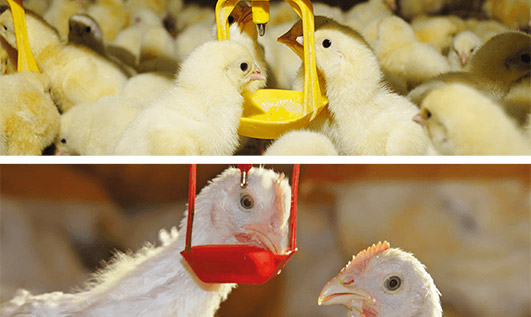Because the temperature in winter is always low, it will bring inconvenience when we raise chickens, and the temperature is not good for the laying hens. Pay attention to chickens in winter. This way we can raise chickens and give them a good living environment in automatic poultry farm equipment price in ghana.

1. cold insulation. The temperature in the laying hen's house is usually best kept at about 15 degrees, and the low temperature will have a greater impact on the laying hens. The house must be well insulated in advance. You can increase the density of chicken cages, close doors and windows, add straw curtains, drink warm water and stove heaters to keep warm.
2. Increase the feeding amount. Chickens rely on the feed they eat to gain heat to maintain their body temperature. The lower the outside temperature, the more heat the chicken consumes to keep out the cold. In winter, the chicken feed must have sufficient energy. In addition to ensuring a certain percentage of protein, high-energy feed containing more starch and sugar should be appropriately added to meet the chicken's physiological and production needs.
3. Supplement the light. In winter, the total time of daylight for the chickens must not be less than 14 hours, and cannot exceed 17 hours. Make up each morning and evening.
4. Water supply. The water temperature should not be too low. Generally, the water temperature is preferably 10 ℃ ~ 20 ℃. To ensure that the water quality is clean and hygienic, sufficient drinking water should be provided. The chicken's water requirement is generally twice that of the feed. The sufficient drinking water should be provided to allow chickens to drink freely.
5. Enhance physical fitness. In winter, the chicken's resistance decreases. Special attention should be paid to the disease prevention work of chickens, and regular vaccination should be carried out. Some preventive medicines can also be fed regularly, and the preventive medicines in the feed can be appropriately increased. Do not feed moldy feed, sewage and cold water with ice and snow.
6. Ventilation. In cold climates, the relationship between ventilation and warmth should be handled, and the manure and debris in the chicken house should be removed in time to ensure the air in the chicken house is fresh. When the weather is good at noon, open the window to ventilate, so that the air in the house is fresh and oxygen is sufficient.
7. Eliminate the enemy. In winter, mice and weasels often gather in hen houses to steal food, bite utensils, and even infect diseases, bite or bite chickens, or cause stress reactions in chickens poultry farming equipment.
The above is a reminder of laying hen breeding equipment in the winter that you need to pay attention to laying hens. I hope to help you to the breeding hens.
